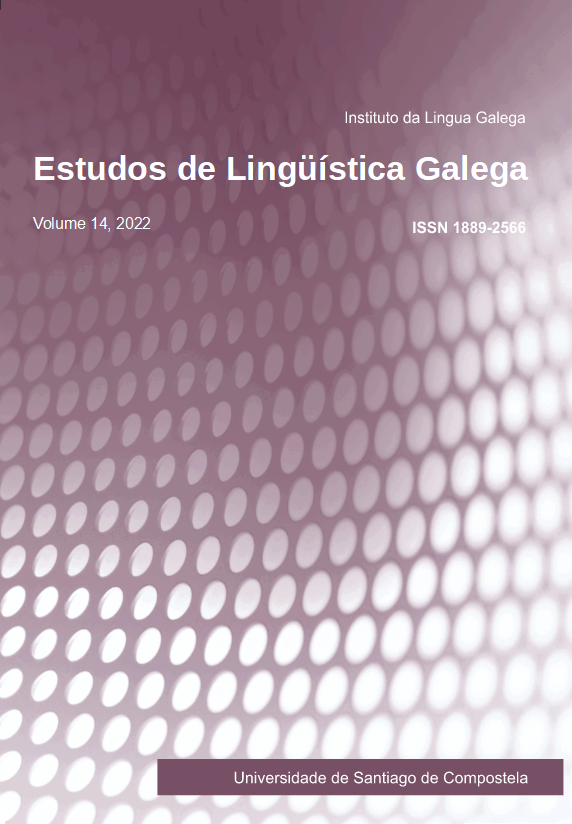Syntactic variation in sixteenth-century Portuguese: the position of clitic pronouns
Main Article Content
Abstract
This work reexamines in the light of new data a proposal put forward in Martins (2011) concerning the historical development of clitic placement in Portuguese. Prima facie, this syntactic change follows a surprising path apparently involving a sudden reversal in the direction of change after the sixteenth century. It is argued in this paper that previous analyses, including that of the present author, fail to recognise the existence in sixteenth century and later Portuguese of two (social) dialects as regards the position of clitic pronouns. A simplistic observation of textual sources masks the complexity of the linguistic situation in the historical period in question, creating an illusion of continuity between different objects. The present study uses the sixteenth century cookbook Livro de Cozinha de um Frade Português do Século XVI, edited by Anabela Leal de Barros (2013), as an especially valuable textual source to help us understand the history of clitic placement in Portuguese.
Keywords:
Article Details
References
Álvarez, Rosario / Xosé Xove (2002): Gramática da Lingua Galega. Vigo: Galaxia.
Barros, Anabela Leal de (ed.) (2013): As Receitas de Cozinha de Um Frase Português do Século XVI. Coimbra: Imprensa da Universidade de Coimbra.
Batllori, Montserrat / Narcís Iglésias / Ana Maria Martins (2005): «Sintaxi dels clítics pronominals en català medieval», Caplletra 38, 137-177.
Bestillero Belo (2000): «A Posición dos Clíticos no Galego dos Séculos XIII ó XVI». Ms. inédito, Universidade de Santiago de Compostela.
Bouzouita, Miriam (2008): The Diachronic Development of Spanish Clitic Placement. Tese de doutoramento, King’s College London.
Bouzouita, Miriam (2008): «At the Syntax-Pragmatics Interface: Clitics in the History of Spanish», em Robin Cooper / Ruth Kempson (eds.), Language in Flux: Dialogue Coordination, Language Variation, Change and Evolution. London: College Publications, 221-263.
Castillo Lluch, Mónica (1996): La Posición del Pronombre Átono en la Prosa Hispánica Medieval. Tese de doutoramento inédita, Université Paris XIII.
Corpus do Português (1300s-1900s), Davies, Mark / Michael Ferreira (2006-). http://www.corpusdoportugues.org
Döhla, Hans-Jörg (2014): «Diachronic convergence and divergence in differential object marking between Spanish and Portuguese», em Kurt Braunmüller / Steffen Höder / Karoline Kühl (eds.), Stability and Divergence in Language Contact. Factors and Mechanisms. Amsterdam/ Philadelphia: John Benjamins, 265–289.
Fischer, Susan (2002): The Catalan Clitic System: A Diachronic Perspective on its Syntax and Phonology. Berlin: Mouton de Gruyter.
Galves, Charlotte [2014]: «The Tycho Brahe Corpus of Historical Portuguese: Methodology and results», Language Variation. Special Issue on Romance Parsed Corpora (C. Tortora / B. Santorini / F. Blanchette, eds.) (no prelo).
Galves, Charlotte / Helena Britto / M. Clara Paixão de Sousa (2005): «The change in clitic placement from Classical Portuguese to Modern European Portuguese: Results from the Tycho Brahe Corpus», Journal of Portuguese Linguistics 4.1, 39-67.
Galves, Charlotte / M. Clara Paixão de Sousa (2005): «Clitic placement and the position of subjects in the history of European Portuguese», em Twan Geerts / Ivo van Ginneken / Haike Jacobs (eds.), Romance Languages and Linguistic Theory 2003, Selected Papers from ´Going Romance 2003. Amsterdam / Philadelphia: John Benjamins, 97-113.
Granberg, Robert Arthur (1988): Object Pronoun Position in Medieval and Early Modern Spanish. Tese de doutoramento, UCLA.
Keniston, H. (1937): The Syntax of Castillian Prose: The Sixteenth Century. Chicago / Ilinois: The University of Chicago Press.
Kroch, Anthony (1989): «Reflexes of Grammar in Patterns of Language Change». Language Variation and Change 1, 199-244.
Kroch, Anthony (1994): «Morphosyntactic Variation», em K. Beals / J. Denton / R. Knippen / L. Melnar / H. Suzuki / E. Zeinfeld (eds.), Papers from the 30th Regional Meeting of the Chicago Linguistic Society: The Parasession on Variation and Linguistic Theory. Chicago: CLS, 180-201.
Kroch, Anthony (2001): «Syntactic Change», em Mark Baltin / Chris Collins (eds.), Handbook of Contemporary Syntactic Theory. Oxford: Blackwell, 699-729.
Martins, Ana Maria (1994): Clíticos na História do Português. Tese de doutoramento, Faculdade de Letras da Universidade de Lisboa.
Martins, Ana Maria (2011): «Clíticos na história do português à luz do teatro vicentino». Estudos de Lingüística Galega 3, 83-109.
Martins, Ana Maria (2012): «Coordination, gapping, and the Portuguese inflected infinitive: The role of structural ambiguity in linguistic change», em Dianne Jonas / John Whitman / Andrew Garrett (eds.), Grammatical Change: Origins, Nature, Outcomes. Oxford / New York: Oxford University Press, 274-291.
Martins, Ana Maria (2013a): «Copiar o português duocentista: A Demanda e o José de Arimateia», em Rosario Álvarez / Ana Maria Martins / Henrique Monteagudo / Maria Ana Ramos (eds.), Ao Sabor do Texto. Estudos dedicados a Ivo Castro. Santiago de Compostela: Universidade de Santiago de Compostela, 383-402.
Martins, Ana Maria (2013b): «A posição dos pronomes pessoais clíticos», em Eduardo Paiva Raposo / Maria Fernanda Bacelar / Maria Antónia Mota / Luísa Segura / Amália Mendes (eds.), Gramática do Português. Lisboa: Fundação Calouste Gulbenkian, 2231-2302.
Neto, Sílvio de A. Toledo (2001): Livro de José de Arimatéia (Lisboa, AN/TT, Livraria, Cód. 643): Camadas Lingüísticas da Tradução Ibérica ao Traslado Quinhentista. Tese de doutoramento, Universidade de São Paulo, Faculdade de Filosofia, Letras e Ciências Humanas.
Nieuwenhuijsen, D. (2006): «Cambios en la colocación de los pronombres átonos», em C. Concepción Company (ed.), Sintaxis Histórica del Español. 2 vols. México: UNAM / Fondo de Cultura Económica, 1337-1404.
Paixão de Sousa, Maria Clara (2004): Língua Barroca: Sintaxe e História do Português de 1600. Tese de doutoramento Campinas, São Paulo.: Instituto de Estudos da Linguagem, Universidade Estadual de Campinas.
Post Scriptum: A Digital Archive of Ordinary Writings (Early Modern Portugal and Spain), Rita Marquilhas (coord.) (2012- ). http://www.clul.ul.pt/en/resources/462-post-scriptum-home
Rocha, Nilzete (2009): Clíticos: Ingrediente na Cozinha Portuguesa do século XVII. Tese de doutoramento. Salvador, Bahia: Universidade Federal da Bahia.
Most read articles by the same author(s)
- Ana María Martins, Clitics in the history of Portuguese in the light of Vicente’s plays , Estudos de Lingüística Galega: Vol 3 (2011)
- Ana Maria Martins, Microvariação na sintaxe dos clíticos: os dialetos portugueses dos Açores e Madeira , Estudos de Lingüística Galega: Vol 13 (2021)






